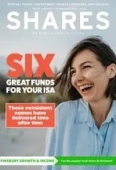No relief in sight for beleaguered Finsbury Growth & Income so far in 2024

By his own admission, Nick Train, manager of Finsbury Growth & Income (FGT), isn’t one for nostalgia, whether that is reflecting on past glories or the ‘melancholy fact’ as he puts it that the popular investment trust has underperformed the FTSE All-Share index for the last three years.
Moving into 2024, the trust has again lagged the benchmark with a share price return of -1.9% in January against -1.3% for the benchmark.
Shares attended the trust’s AGM (annual general meeting) to hear investors’ concerns and ponders what has caused the recent run of inferior performance.
GREATER SELLING DISCIPLINE NEEDED
In his December fund commentary Train ascribed the trust’s underperformance in 2023 to a lack of exposure to energy and mining stocks, which is understandable as ‘quality investors’ don’t tend to like businesses where prices are set by the global market.
Energy and mining companies have no influence over the price at which they sell their products – they are price-takers rather than price-makers.
That is only half the story, however, as the manager also admits that aside from sector allocation being a drag he has ‘invested in some companies where my confidence in their earnings power and undervaluation has been misplaced, at least to date’.
As the table shows, four of the trust’s top 10 holdings lost money last year, which given the level of concentration (the top 10 stocks account for nearly 85% of the portfolio) means even with the top four stocks delivering double-digit gains it was always going to be an uphill battle.
This tendency isn’t restricted to Finsbury Growth & Income, but unfortunately it does mean a couple of last year’s culprits have gone on to rack up further losses this month.
BOTTOM UP OR TOP DOWN?
While not owning resource stocks is reasonable given the manager’s preference for quality businesses, the bias towards consumer stocks, which make up two thirds of the portfolio as of the end of January, needs further explanation.
According to the fact sheet, the manager uses a bottom-up stock-picking approach to find ‘excellent companies that appear mostly undervalued’, although there is no explanation of the process or how the trust comes to own the stocks it does.
If anything, the portfolio gives the impression of being constructed using a top-down process, completely the opposite of bottom up, given its heavy concentration in just a handful of sectors.
Using a bottom-up process which takes into account growth and value, it is hard to see how stocks such as Diageo, Experian or RELX would make the cut given they have only grown their earnings at a mid-single digit rate over the last 30 years and none could be said to be cheap.
Other companies, which have shown superior growth in the past such as Sage and Schroders (SDR), seem to have gone off the boil completely in terms of earnings, yet both still have a place in the trust, whereas there would seem to be plenty of alternative options in other areas of the market, particularly in industrials and healthcare.
TOO MUCH FOCUS ON VALUE?
Another characteristic of the trust, and of the Lindsell Train management style in general, seems to be a preference for second-tier players rather than market leaders, which is presumably driven by value considerations.
Given the decision to buy a luxury stock, and the trust’s leeway to invest up to 20% of its assets outside the UK, we can only assume the manager chose Burberry rather than one of the clear industry leaders in terms of growth and margins such as Hermès (RMS:EPA) or LVMH (MC:EPA) on the basis the UK firm was trading at a discount.
Where the trust does own foreign stocks, it has doubled up on its UK holdings. For example, it owns spirits maker Remy Cointreau (RCO:EPA) as well as Diageo, a strategy which didn’t pay off at all last year with the French stock losing 27%, creating a 1.4% drag on returns on top of the 2.4% drag from Diageo.
Sage is another curious choice, considering there are plenty of US software companies with much better track records and Europe has its own world-leading technology company in semiconductor equipment maker ASML (ASML:AMS).
That being said, at the current price Burberry now looks quite good value, assuming it can revive its earnings, and we agree with the manager on the recent addition to the portfolio of housing portal Rightmove (RMV), which has been unfairly punished by the market on the assumption its leading position is about to be undermined.
Where we are less convinced is the notion that the trust is a carefully curated collection of ‘AI beneficiaries’ as the latest fact sheet purports.
The increase in digitalisation in recent years and the resulting exponential increase in data has undoubtedly fuelled a need to aggregate and process Big Data, and we are great believers in the value of proprietary data sets, but to lump Experian, Hargreaves Lansdown, London Stock Exchange Group (LSEG), RELX, Rightmove and Sage together as AI ‘plays’ seems to be over-generous.
For example, we suspect the original argument for buying into London Stock Exchange Group in the early 2000s had little to do with data (the firm itself has only recently supercharged its expansion in this area with the acquisition of Refinitiv) and more to do with it being a monopoly business with steady cash flows.
Similarly, RELX and Sage, which were also acquired in the early 2000s, have always been considered as subscription businesses which generate ‘evergreen’ income streams and have only recently been co-opted into the AI theme.
On a 10-year basis Finsbury Growth & Income has comfortably outpaced its sector with an annualised return of 7.5% but the trust has some convincing to do if it is to narrow a current 7.1% discount to net asset value. The ongoing charge is 0.61%.
BIG QUESTIONS POSED AT THE FINSBURY GROWTH & INCOME AGM
Shares investment writer Sabuhi Gard attended the Finsbury Growth & Income annual general meeting on 17 January 2024 at the City of London’s Guildhall. Here were some of the key questions raised and a summary of manager Nick Train and his team’s responses.
WILL CHINA TURN ROUND IN 2024?
Train made no bones about the fact companies such as Burberry (BRBY) and Diageo (DGE) need the Chinese economy and consumers to recover their appetite for their brands to stave off further mediocre performance but offered no inkling as to the timing of a recovery.
WHAT DOES THE FUTURE HOLD FOR MANCHESTER UNITED?
The trust has a 2% weighting in the trust in Manchester United (MANU:NYSE) and Train admitted he was ‘undecided on the future of the stake’, adding he appreciated the Glazer family wanted to realise the fullest value possible in the event of a sale (note the AGM was held before it was confirmed the Premier League had approved Sir Jim Ratcliffe’s purchase of a 25% stake in the club).
WHAT ARE YOU DOING ABOUT HUMAN RIGHTS?
The holding which has attracted the most attention regarding human rights is US confectionary firm Mondelez (MDLZ:NASDAQ), where Finsbury Growth & Income has a 5.7% portfolio weighting.
‘All we can say is that the company’s human rights record is getting better through Cocoa Life – Mondelez’s global cocoa sustainability program launched in 2012 – which wants to transform the cocoa supply chain. The firm is investing $400 million dollars to empower at least 200,000 cocoa farmers,’ commented deputy portfolio manager Madeleine Wright.
HOW IS THE TRUST INVESTING IN AI (ARTIFICIAL INTELLIGENCE)?
Wright said: ‘Our best-performing companies in January were from the data and software sector like RELX (REL), Hargreaves Lansdown (HL.), Experian (EXPN) and Sage (SGE). These are all beneficiaries of the AI theme. If you had invested £100 in RELX 40 years ago that £100 would now be worth £35,000.’ [SG]
Important information:
These articles are provided by Shares magazine which is published by AJ Bell Media, a part of AJ Bell. Shares is not written by AJ Bell.
Shares is provided for your general information and use and is not a personal recommendation to invest. It is not intended to be relied upon by you in making or not making any investment decisions. The investments referred to in these articles will not be suitable for all investors. If in doubt please seek appropriate independent financial advice.
Investors acting on the information in these articles do so at their own risk and AJ Bell Media and its staff do not accept liability for losses suffered by investors as a result of their investment decisions.
Issue contents
Editor's View
Feature
Great Ideas
Money Matters
News
- Why interest in Currys could spark further mergers and acquisitions in the sector
- What have the top US fund managers been doing recently?
- XP Power plummets to 10-year low after two successive profit warnings
- YouGov looks in great shape amid talk of move to US listing
- Uber unveils $7 billion buyback as ride hailing firm shocks investors

 magazine
magazine








